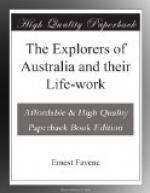“If the sanguine hopes to which the discovery of this river (the Macquarie) has given birth should be realised, and it should be found to empty itself into the ocean in the north-west coast, which is the only part of this vast island that has not been accurately surveyed, in what mighty conceptions of the future power and greatness of this colony may we not reasonably indulge? The nearest point at which Mr. Oxley left off to any part of the western coast is very little short of two thousand miles. If this river therefore be already of the size of the Hawkesbury at Windsor, which is not less than two hundred and fifty yards in breadth, and of sufficient depth to float a seventy-four gun ship, it is not difficult to imagine what must be its magnitude at its confluence with the ocean, before it can arrive at which it has to traverse a country nearly two thousand miles in extent. If it possesses the usual sinuosities of rivers, its course to the sea cannot be less than from five to six thousand miles, and the endless accession of tributary streams which it must receive in its passage through so great an extent of country will, without doubt, enable it to vie in point of magnitude with any river in the world.”
It was to realise such ambitious hopes as these that Oxley went forth to penetrate into the interior.
CHAPTER 3. JOHN OXLEY.
[Illustration. John Oxley. From a portrait in the possession of Mrs. Oxley, of Bowral. The portrait was presented to Mrs. King, widow of Governor King in 1810, and signed by him.]
3.1. General biography.
Oxley was born in England in the early part of 1781. In his youth he entered the navy, saw active service in many parts of the world, and rose to the rank of Lieutenant. He came to Australia in January, 1812, and was appointed Surveyor-General.
Throughout his career in Australia, Oxley would seem to have won the friendship and respect of all he came in contact with. Captain Charles Sturt, in the journal of his first expedition, wrote of him as follows:—
“A reflection arose to my mind, on examining these decaying vestiges of a former expedition, whether I should be more fortunate than the leader of it, and how far I should be able to penetrate beyond the point which had conquered his perseverance. Only a week before I left Sydney I had followed Mr. Oxley to the tomb. A man of great quickness and of uncommon ability. The task of following up his discoveries was no less enviable than arduous.”
These thoughts were suggested to Sturt when standing at one of Oxley’s old camps, and coming from such a man carry great weight.
The following obituary notice of Oxley appeared in the Government Gazette of May 27th, 1828.
“It would be impossible for his Excellency, consistently with his feelings, to announce the decease of the late Surveyor-General without endeavouring to express the sense he entertains of Mr. Oxley’s services, though he cannot do justice to them.




